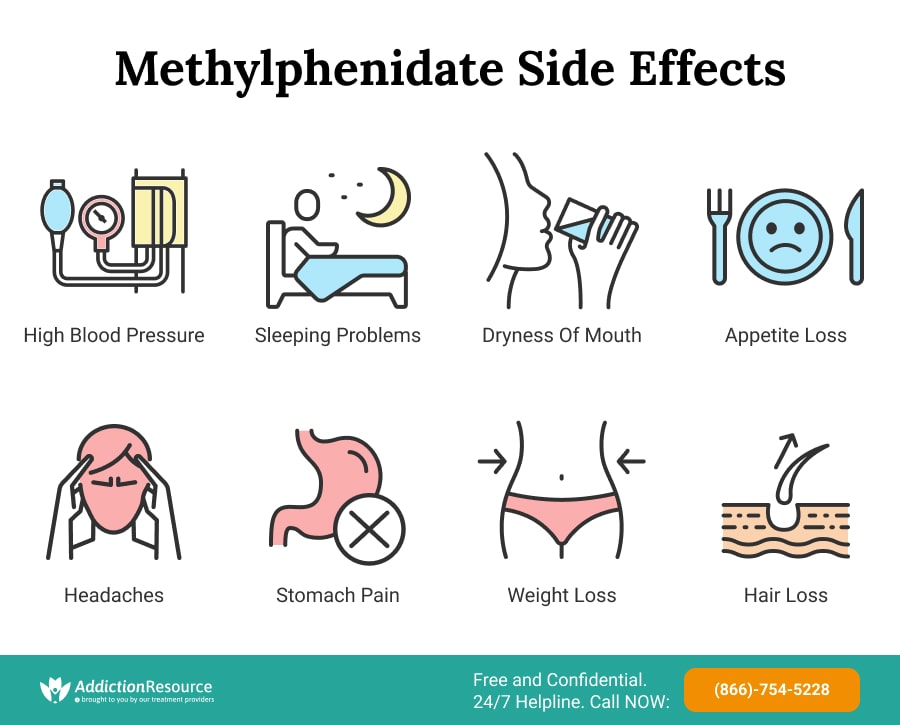Methylphenidate, known by the brand names Ritalin or Concerta, is a CNS stimulant. It is used in the treatment of narcolepsy and attention deficit hyperactivity disorder (ADHD). Its primary mechanism of action involves increasing the dopamine level in the brain.
Table Of Contents:
Like any other medication, methylphenidate has many adverse effects which can occur when one does not use it as prescribed. However, it is an addictive medication, and as a result, many people may misuse it, either by using it for longer than intended or at a dose that is too high. It will increase the risk of adverse effects occurring. Misuse can lead to death in the worst cases, and as a result, it is vital to know methylphenidate side effects.
Ritalin Effects: What Does It Do?
As a CNS stimulant, this drug can increase a person’s alertness and attention and reduce fatigue.
Narcolepsy is a condition that causes a person to very frequently feel sleepy in the daytime and sometimes fall asleep involuntarily. Ritalin effects help counteract this by increasing the activity in the central nervous system, helping the person stay awake.
In the treatment of attention deficit hyperactivity disorder, the drug works by improving attention and motivation. It also helps decrease how distractible patients are. These Ritalin effects help in the treatment of impulsivity and inattention in children with ADHD.
Common Ritalin Side Effects
These methylphenidate adverse reactions occur in a majority of patients taking it. If one has any concerns or any of these adverse health effects persist, they should talk to their doctor right away.
The Common Reactions Include:
- Racing heartbeat
- Elevated blood pressure
- Sleep problems
- Dryness of mouth
- Appetite loss
- Headache
- Stomach pain
It is also essential to keep in mind that methylphenidate can cause addiction, which is a severe adverse effect. It perpetuates continuous misuse of drugs, increasing the risk of other methylphenidate side effects occurring.
Concerta Headache
One of the relatively mild Concerta side effects that have been reported on occasion with its use is a headache. One study observed the adverse effects of Ritalin in children undergoing treatment for ADHD found a Concerta headache to be a common side effect, though more frequent when the drug was used in combination with another.

A 2013 study also discussed the information that found that 24% of patients on methylphenidate complained of a Concerta headache.
Ritalin Weight Loss
Among the very well-documented Ritalin effects is its effect on weight: namely, weight loss. As far back as 1984, weight loss has been documented as a side effect of Concerta, with the possible consequence being growth suppression in children being treated for ADHD. A 1969 study also found weight loss to be a principal Concerta side effect in the sampled children.
A 2012 research study linked the weight loss that Ritalin causes to appetite suppression. It has led to research on how drugs like this can be applied to treat obesity.
Ritalin Anxiety
That Methylphenidate can induce anxiety has been proven in animal studies, though few studies have examined the prevalence of this side effect in humans. Still, it is well-established to be an adverse reaction to the substance. Another animal study was able to gather important information that showed that using an antidepressant such as venlafaxine could reduce the intensity of methylphenidate-induced anxiety.
Hair Loss
Hair loss, known in the medical space as alopecia, can be one of the more distressing Concerta side effects known to occur. Several case studies report this unusual adverse effect on health. For example, this one reports alopecia in a child being treated for ADHD. The same was seen in a seven-year-old girl who was also being treated for attention deficit hyperactivity disorder.
Interestingly, one case report showed resolution of hair loss both on discontinuation of Ritalin and dose escalation.
Rare Concerta Side Effects
Only a small fraction of patients experience one or more of the following symptoms. For this reason, users may become panicked when they have them. However, most of the less common Methylphenidate side effects are not very serious. Therefore, patients don’t have to stop using the drug, thinking they might be in some health trouble. However, they should talk to their doctor about these adverse reactions.
Always consult with a medical doctor before quitting any medication. Of course, watch for the following Ritalin side effects if your loved one is taking it. In case they worsen, consult the doctor right away.
Rare Adverse Reactions Are:
- Chest pain
- Fever
- Tendency to bleed
- Involuntary body movements
- Joint pain
- Stuffy nose and heavy head
- Aggressiveness
- Cough
- Dizziness
- Sweating more than normal
In some cases, the major effects of Ritalin listed above do not occur quite often. However, they might be severe. Therefore, if any of these symptoms are noticed, quickly tell a doctor.
Methylphenidate Lung
Methylphenidate lung is a series of changes in the lungs in people who abuse this medication intravenously. It manifests with the lung changes of emphysema, which is widening of the air spaces and destruction of the air sac walls. This condition only occurs in those who abuse the drug intravenously. A study showed that this complication can get so severe as to result in death.
Methylphenidate Allergic Reactions: Symptoms
Allergic reactions to Methylphenidate are not actual adverse effects. Instead, they occur when immune function turns hostile to the medication in the blood. In other cases, they are from other ingredients in the preparation.

Some allergies are mild in nature. For instance, there can be the appearance of a rash from the use of this medication. Many of the allergic reactions manifest on the skin as symptoms such as urticaria or exfoliative dermatitis. A case study documented information on a young girl who had swelling of the eyelids and red eyes as primary symptoms of her reaction to the medication.
On the other hand, some can be fatal. Therefore, users should not take any of the symptoms on a light note.
Stop Taking It and Seek Emergency Medical Attention if They Have Any of These Methylphenidate Allergy Symptoms:
- Itchy skin, rashes, or hives
- Swelling of the tongue, face, or throat
- Breathing problems
- Severe dizziness
If they have a known allergy to specific drugs, inform a doctor. A therapist can remove Ritalin from the system through detoxification procedures together with allergy symptoms.
Methylphenidate Warnings
Before taking methylphenidate, consult a healthcare practitioner. This way, a patient can make sure that it is safe for them to use. A doctor will let a patient know if they can continue to start using the medicine. Otherwise, they may alter a prescription in some way.
A Person Should Not Be Taking This Drug if They Have:
- Family- or personal history of muscle twitches
- Personal- or family history of Tourette’s Syndrome
- Severe tension, anxiety, or agitation
- Glaucoma
Ritalin is known to aggravate symptoms such as anxiety and agitation due to its stimulant effect on the CNS. That is why people who show these symptoms should avoid it.
The medication is linked to increased intraocular pressure, which is the underlying danger in glaucoma. The mechanism by which it achieves this is not entirely certain, but it should be avoided in those who already suffer from glaucoma.

It is also preferred to stay away from using the drug if there is a history of muscle twitches, tics, or Tourette’s syndrome. Information from some studies points to the likelihood that the drug worsens those symptoms.
Remember to Tell a Doctor if One Has a Personal- or Family History With:
- High blood pressure
- Heart problems (this includes a congenital heart defect, family history of sudden death, or heart disease)
- Problems with blood circulation in hands or feet
- Epilepsy or seizures
- Depression, bipolar disorder, mental illness
- An alcohol or drug addiction
- Abnormal EEG test results
- Problems with intestines, esophagus, or stomach
Always keep in mind that one has to tell a doctor if a person is pregnant or breastfeeding. There have been few well-conducted studies looking into the effect of this drug on pregnancy and fetal development. Information from a study following up several women who had had exposure to Ritalin during pregnancy showed no significant difference in the risk of congenital anomalies in their children compared to women who weren’t exposed to the drug.
However, animal studies have shown that the drug has teratogenic risk, though that occurs most frequently at doses well above the maximum recommended dose for humans. It is also not certain whether the drug passes into breast milk, though most drugs do.
How to Avoid Ritalin Side Effects?
Of course, one can prevent some Ritalin side effects by taking measures of precaution. For instance, to avoid sleeping problems, patients should take the medication in the morning. In addition, eating healthy and exercising may help to curb some of Ritalin side effects.
Make sure to inform the physician if one has any chronic conditions to lower the risks of methylphenidate side effects. Also, it is of the essence to tell a doctor if a patient has a history of drug abuse. And last but not least, while on Ritalin, avoid using alcohol as it can make the medicine absorb even faster and provoke adverse reactions development.
If the medication causes more harm than good, the doctor may consider switching to another medication. For instance, Ritalin is similar to Adderall, and they have equal effectiveness for ADHD.
In cases where addiction to the drug has already developed, it is essential to seek help at a professional treatment center as soon as possible. It will reduce the risk of severe adverse effects occurring and will help to repair the damage that the addiction has caused.
Hope Without Commitment
Find the best treatment options. Call our free and confidential helpline
Most private insurances accepted
Page Sources
- Rothschild, C. J., & Nicol, H. (1972). Allergic reaction to methylphenidate. Canadian Medical Association journal, 106(10), 1064. https://www.ncbi.nlm.nih.gov/pmc/articles/PMC1940697/
- Sverd, J., Hurwic, M. J., David, O., & Winsberg, B. G. (1977). Hypersensitivity to methylphenidate and dextroamphetamine: a report of two cases. Pediatrics, 59(1), 115–117. https://pubmed.ncbi.nlm.nih.gov/840528/
- Confino-Cohen, R., & Goldberg, A. (2005). Successful desensitization of methylphenidate-induced rash. Journal of child and adolescent psychopharmacology, 15(4), 703–705. https://pubmed.ncbi.nlm.nih.gov/16190802/
- Stern, E. J., Frank, M. S., Schmutz, J. F., Glenny, R. W., Schmidt, R. A., & Godwin, J. D. (1994). Panlobular pulmonary emphysema caused by i.v. injection of methylphenidate (Ritalin): findings on chest radiographs and CT scans. AJR. American journal of roentgenology, 162(3), 555–560. https://pubmed.ncbi.nlm.nih.gov/8109495/
- Schmidt, R. A., Glenny, R. W., Godwin, J. D., Hampson, N. B., Cantino, M. E., & Reichenbach, D. D. (1991). Panlobular emphysema in young intravenous Ritalin abusers. The American review of respiratory disease, 143(3), 649–656. https://pubmed.ncbi.nlm.nih.gov/2001078/
- National Clinical Guideline Centre (UK). Drug Allergy: Diagnosis and Management of Drug Allergy in Adults, Children and Young People. London: National Institute for Health and Care Excellence (UK); 2014 Sep. (NICE Clinical Guidelines, No. 183.) Available from: https://www.ncbi.nlm.nih.gov/books/NBK248066/
- Gottlieb S. (2001). Methylphenidate works by increasing dopamine levels. BMJ (Clinical research ed.), 322(7281), 259. https://www.ncbi.nlm.nih.gov/pmc/articles/PMC1119521/
- Pataki, C. S., Carlson, G. A., Kelly, K. L., Rapport, M. D., & Biancaniello, T. M. (1993). Side effects of methylphenidate and desipramine alone and in combination in children. Journal of the American Academy of Child and Adolescent Psychiatry, 32(5), 1065–1072. https://pubmed.ncbi.nlm.nih.gov/8407753/
- Diav-Citrin, O., Shechtman, S., Arnon, J., Wajnberg, R., Borisch, C., Beck, E., Richardson, J. L., Bozzo, P., Nulman, I., & Ornoy, A. (2016). Methylphenidate in Pregnancy: A Multicenter, Prospective, Comparative, Observational Study. The Journal of clinical psychiatry, 77(9), 1176–1181. https://pubmed.ncbi.nlm.nih.gov/27232650/
- Novartis, Ritalin Prescribing Information, https://www.accessdata.fda.gov/drugsatfda_docs/label/2010/010187s073lbl.pdf
- Lu, C. K., Kuang, T. M., & Chou, J. C. (2006). Methylphenidate (Ritalin)-associated cataract and glaucoma. Journal of the Chinese Medical Association : JCMA, 69(12), 589–590. https://pubmed.ncbi.nlm.nih.gov/17182354/
- Ardic, U. A., & Ercan, E. S. (2017). Resolution of methylphenidate osmotic release oral system-induced hair loss in two siblings after dose escalation. Pediatrics international : official journal of the Japan Pediatric Society, 59(11), 1217–1218. https://pubmed.ncbi.nlm.nih.gov/29359460/
- Bilaç, Ö., Kütük, M. Ö., & Bilaç, C. (2018). Hair loss due to methylphenidate use: A case study. Indian journal of psychiatry, 60(1), 159–160. https://www.ncbi.nlm.nih.gov/pmc/articles/PMC5914255/




